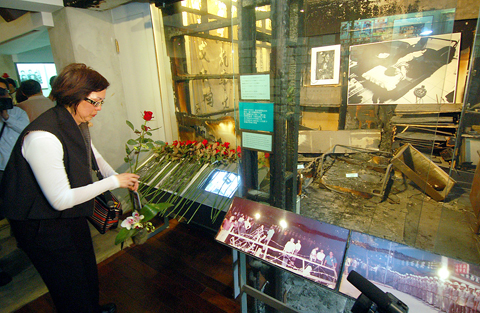Through board games, drama, debates and field trips, teachers who yesterday won a human rights curriculum design award want more elementary and high school students to get a firsthand idea of the abstract concept of human rights.
“I was shocked when I first walked into this place, and I think my students will feel the same, too,” said Tsai Ming-huang (蔡銘晃), a civic education teacher at Taipei Municipal Fuxing Senior High School, as he described how he felt when he first visited the well-preserved site where late human rights activist Deng Nan-jung (鄭南榕) set himself aflame in 1989 to protest the lack of freedom of speech under the authoritarian rule of the Chinese Nationalist Party (KMT) regime at the time.
The award ceremony was held there yesterday.

PHOTO: LO PEI-DER, TAIPEI TIMES
Tsai worked with his colleague Kuo Wen-ying (郭文瑛) to design one curriculum about the site and another on the 228 Memorial Museum — both of the designs won recognition.
“A major problem that we often run into when we teach students about human rights is that it’s a very abstract idea,” Tsai said. “But here, everything is so well preserved that as you walk into this place, you feel you’ve traveled through a time warp and can actually feel the atmosphere.”
While Tsai and Kuo’s curriculum focused mostly on visiting sites where actual historic events took place, four teachers from Anshun Primary School in Tainan worked together to incorporate field trips, drama, debate and even a board game modeled after Monopoly into the curriculum they designed.
“We realized in class that kids today know 228 Day more as a holiday and don’t often have a good idea about what the 228 Incident was,” said Tseng Kui-feng (曾桂鳳), one of the teachers. “So we decided that maybe we should take the kids to places where things actually happened and tell them the stories.”
However, as Tseng and her team started to work, different ideas popped up.
Tseng’s colleague, Chen Ping (陳稟), who had taken part in drama training, wrote a short play featuring fighting between different animals in a park to show the boundary between freedom and abuse of freedom.
Huang Mei-hua (黃美華), another teacher on Tseng’s team, created a board game in which players would be asked a question related to human rights each time they moved to a new block.
To show how the human rights issue was not something “far away,” Tseng asked students to debate on whether parents should be allowed to read their children’s letters without permission.
Tsao Chin-jung (曹欽榮), a member of the Truth and Reconciliation Association, said that it was important to teach about human rights to prevent repeating the mistakes of the past.
“It’s been only 20 years since Deng set himself on fire — is it a long time? No, it’s not, but it’s long enough for our younger generation born after martial law was lifted to not know about it,” he said. “That explains why we need to start [teaching about human rights] now.”

ALIGNED THINKING: Taiwan and Japan have a mutual interest in trade, culture and engineering, and can work together for stability, Cho Jung-tai said Taiwan and Japan are two like-minded countries willing to work together to form a “safety barrier” in the Indo-Pacific region, Premier Cho Jung-tai (卓榮泰) yesterday said at the opening ceremony of the 35th Taiwan-Japan Modern Engineering and Technology Symposium in Taipei. Taiwan and Japan are close geographically and closer emotionally, he added. Citing the overflowing of a barrier lake in the Mataian River (馬太鞍溪) in September, Cho said the submersible water level sensors given by Japan during the disaster helped Taiwan monitor the lake’s water levels more accurately. Japan also provided a lot of vaccines early in the outbreak of the COVID-19 pandemic,

Kaohsiung Mayor Chen Chi-mai (陳其邁) on Monday announced light shows and themed traffic lights to welcome fans of South Korean pop group Twice to the port city. The group is to play Kaohsiung on Saturday as part of its “This Is For” world tour. It would be the group’s first performance in Taiwan since its debut 10 years ago. The all-female group consists of five South Koreans, three Japanese and Tainan’s Chou Tzu-yu (周子瑜), the first Taiwan-born and raised member of a South Korean girl group. To promote the group’s arrival, the city has been holding a series of events, including a pop-up

TEMPORAL/SPIRITUAL: Beijing’s claim that the next Buddhist leader must come from China is a heavy-handed political maneuver that will fall flat-faced, experts said China’s requirement that the Dalai Lama’s reincarnation to be born in China and approved by Beijing has drawn criticism, with experts at a forum in Taipei yesterday saying that if Beijing were to put forth its own Dalai Lama, the person would not be recognized by the Tibetan Buddhist community. The experts made a remarks at the two-day forum hosted by the Tibet Religious Foundation of His Holiness the Dalai Lama titled: “The Snow Land Forum: Finding Common Ground on Tibet.” China says it has the right to determine the Dalai Lama’s reincarnation, as it claims sovereignty over Tibet since ancient times,

Temperatures in some parts of Taiwan are expected to fall sharply to lows of 15°C later this week as seasonal northeasterly winds strengthen, the Central Weather Administration (CWA) said today. It is to be the strongest cold wave to affect northern Taiwan this autumn, while Chiayi County in the southwest and some parts of central Taiwan are likely to also see lower temperatures due to radiational cooling, which occurs under conditions of clear skies, light winds and dry weather, the CWA said. Across Taiwan, temperatures are to fall gradually this week, dropping to 15°C to 16°C in the early hours of Wednesday